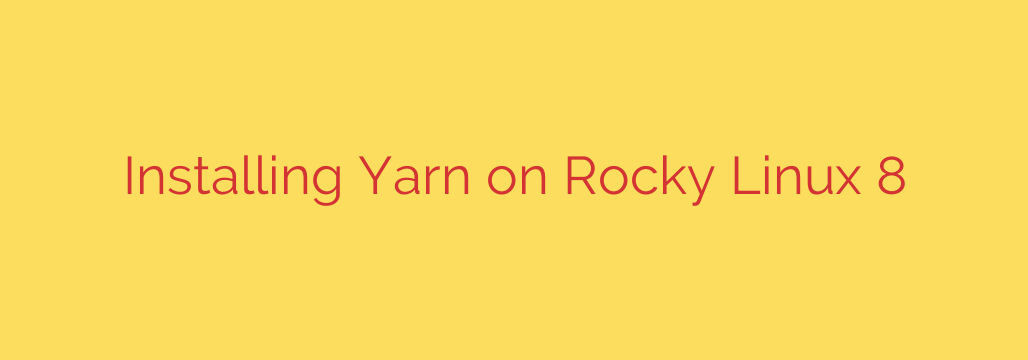
Unlock Faster Package Management: Install Yarn on Rocky Linux 8
For developers working with JavaScript projects on Rocky Linux 8, efficient and reliable package management is crucial. While npm (Node Package Manager) is the default that comes with Node.js, Yarn offers an alternative known for its speed, security, and stability. This guide walks you through the process of installing Yarn on your Rocky Linux 8 system, getting you ready to manage your project dependencies effectively.
Why Choose Yarn?
Yarn was developed to address some limitations perceived in earlier versions of npm. Key benefits include:
- Faster Installation: Yarn caches packages, allowing for quicker installations, especially on repeat projects or with slow internet connections.
- Improved Security: It uses checksums to verify package integrity before installation.
- Reliability: Yarn uses a lock file (
yarn.lock) to ensure consistent installations across different environments.
Prerequisites
Before installing Yarn, you need to have Node.js and npm already installed on your Rocky Linux 8 system. Yarn is typically installed via npm or relies on Node.js being present.
You can check if Node.js and npm are installed by running:
node -v
npm -v
If they are not installed, you will need to install Node.js first. The recommended way is often through the NodeSource repository for the latest versions suitable for your system.
Installing Yarn on Rocky Linux 8
The recommended and most straightforward method for installing Yarn is by adding the official Yarn repository and installing it using the dnf package manager. This ensures you get a stable version that can be easily updated.
Follow these steps:
Step 1: Import the Yarn GPG Key
This step is important for security. It allows your system to verify the authenticity of the packages downloaded from the Yarn repository.
sudo rpm --import https://dl.yarnpkg.com/rpm/pubkey.gpg
Step 2: Add the Yarn Repository
Next, you need to add the Yarn repository configuration to your system’s repository list.
For Yarn 1.x (Classic):
sudo curl -fsSL https://dl.yarnpkg.com/rpm/yarn.repo -o /etc/yum.repos.d/yarn.repo
(Note: Yarn 2+ uses a different installation method, typically via npm, but Yarn 1.x is still widely used and commonly installed this way on Linux distributions).
Step 3: Install Yarn
Now that the repository is added, you can install Yarn using the dnf package manager.
sudo dnf install yarn
Your system’s package manager will resolve dependencies and install Yarn.
Step 4: Verify the Installation
After the installation is complete, verify that Yarn is installed correctly and check its version.
yarn --version
This command should output the installed version number, confirming that Yarn is ready to use.
Getting Started with Yarn
With Yarn installed, you can start managing your JavaScript projects.
- To initialize a new project in a directory:
bash
yarn init
- To add a package dependency to your project:
bash
yarn add [package_name]
- To install all dependencies listed in your
package.json:
bash
yarn install
Conclusion
Installing Yarn on Rocky Linux 8 is a simple process when following these steps. By adding the official repository and using dnf, you ensure a secure and easily maintainable installation. With Yarn’s speed, security, and reliability benefits, you’re well-equipped to handle your Node.js project dependencies efficiently. Start using yarn commands in your project directories and experience faster, more consistent package management.
Source: https://kifarunix.com/install-yarn-on-rocky-linux-8/








